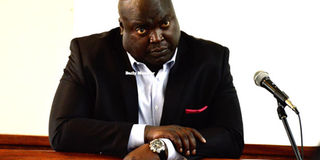Prime
Supreme Court to rule on former NSSF boss, Chandi Jamwa's appeal

Former NSSF boss David Chandi Jamwa in the dock at the Supreme Court in Kololo where he is challenging his conviction and sentence of twelve years in jail On July 19, 2019. PHOTO BY ABUBAKER LUBOWA
What you need to know:
- Justices Kenneth Kakuru and Rubby Opio Aweri wrote the majority judgment in which they agreed with retired Anti-Corruption court judge John Bosco Katutsi that the act of Jamwa selling the government bonds held by NSSF to Crane Bank before their maturity dates cost the Fund a financial loss of Shs3.1b.
The case in which former managing director of National Social Security Fund (NSSF) David Chandi Jamwa is challenging his conviction and 12-year jail sentence awaits judgment before the Supreme Court.
Jamwa appealed against the lower court’s decision faulting the judge for making a wrong decision that led to his conviction.
A panel of five justices led by Dr Esther Kisaakye Thursday said they would deliver their judgment on notice.
Other justices include; Jotham Tumwesigye, Eldad Mwangusya, Lillian Tibatemwa and Paul Mugamba.
Jamwa’s lawyer, Mr David Mpanga told court that he was dissatisfied with the decision of the Court of Appeal that upheld the Anti-Corruption court conviction and sentence against his client.
In his appeal, Jamwa is challenging the court’s re-evaluation of evidence from the Anti-Corruption Court convicting him of abuse of office, causing financial loss and ultimately sentencing him to a jail term.
“Had the Court of Appeal properly re-evaluated the evidence on record, it would have found glaring contradictions in the findings of the trial judge as a clear indication that the trial judge did not properly evaluate the evidence against each of the elements of the offence thus arriving at an absurd conviction,” Mr Mpanga submitted.
Jamwa’s lawyer also doubted the judgment of the Court of Appeal saying that by the time it was delivered, one of the justices on the panel Opio Aweri had been promoted to the Supreme Court bench while Stephen Kavuma had retired leaving Kakuru to deliver the verdict with only two signatures which was irregular.
However, in their response, prosecution led by Mr Rogers Kinobe told court that the judgment held signatures of two judges who were on the panel that heard his appeal hence the decision constituted majority decision without the need for having the signature or input of the dissenting judge.
Mr Kinobe explained that it is only when the presiding judge orders a separate judgment to be given under Rule 33(4) that the same is issued which was not the case in Jamwa’s appeal.
Justices Kenneth Kakuru and Rubby Opio Aweri wrote the majority judgment in which they agreed with retired Anti-Corruption court judge John Bosco Katutsi that the act of Jamwa selling the government bonds held by NSSF to Crane Bank before their maturity dates cost the Fund a financial loss of Shs3.1b.



